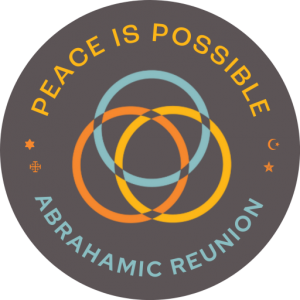50 people attended A Taste of Peacemaking in the Holy Land Part 1: Male Peacemakers, with Rabbi Roberto Arbib, Sheikh Khalid Abu Ras, and Father (Abouna) Firas Diab, and hosted by Sheikh Ghassan Manasra.
“Welcome, everyone,” Michael Macy, Board of Trustees for the Abrahamic Reunion, introduced the online event. “This is the first of a series of three programs which we hope will provide you with the taste of peacemaking: a brief experience into the lives of those people who have committed themselves to the making of peace.”
“Before we begin,” opened Sheikh Ghassan Manasra, “we say to the people, give us yourself, we will give you ourselves. Give us your heart, we will give you our heart. Because the peace is not…come to say… a rational process. Not a mechanical process. It is emotional, Love is the process. The Love is the highest title of making peace.”
Sheikh Manasra then proceeded to interview the featured guests, going to each one with each question as a round-table. Below are excerpts from their answers:
- Q1: How did you come to this pathway of making peace?
- Q2: How do you avoid conflict and polarization in everyday life?
- Q3: How can we make peace during the pandemic?
- Q4: What is the Taste of your peacemaking and process of many years?
“How did you come to this pathway of making peace?”
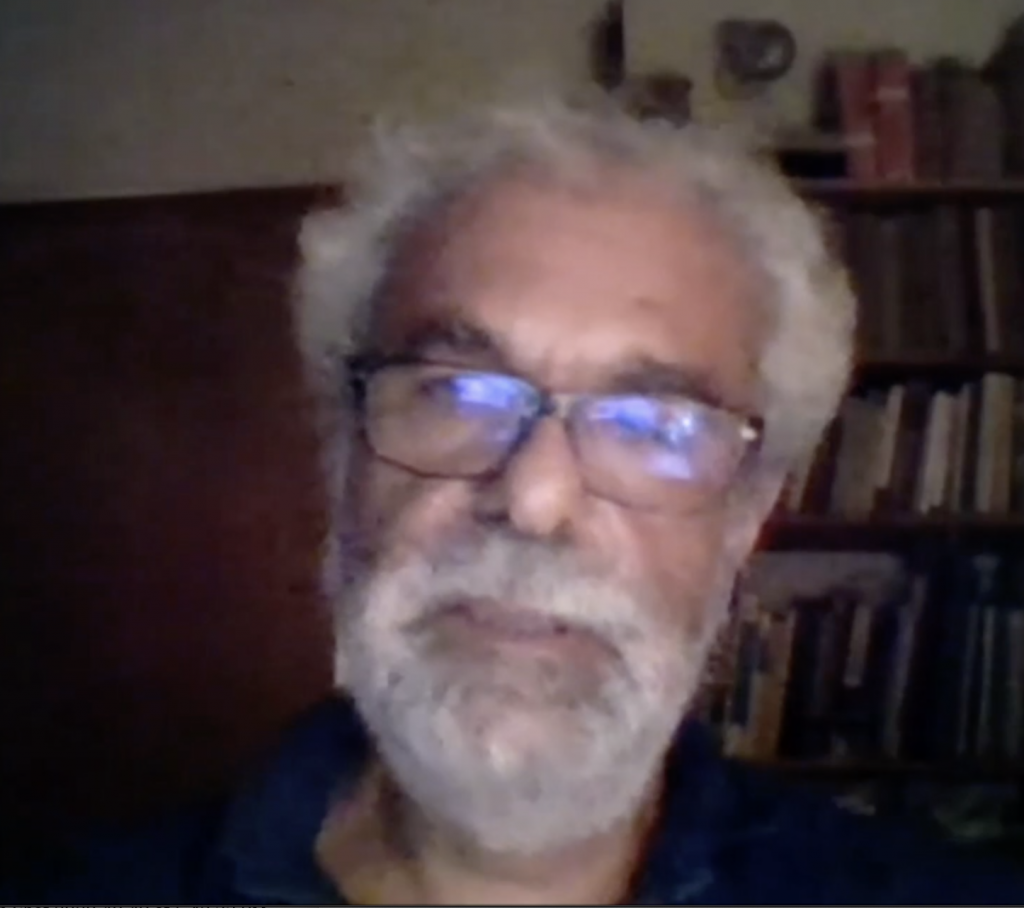
Rabbi Arbib: “My aim of faith, it was to connect the people to the one God and with no difference of color, religion, or language. This is what I started with my grandfather, who was a Rabbi in Rome, that I always received from him the Torah and I remember that in his house it was hosted, it was in Rome of course, Christians and Jews and other people to studying together and meeting together with no distinction—of course with the distinction, but a lot of respect and love for the same God that created all humankind.”
Sheikh Ghassan: “Rabbi, I heard you say this year in the synagogue everyday in Sukkot you invite Abraham, Yakob, and you say we need the last day to invite Prophet Muhammad?”
Rabbi Arbib: “Exactly, and also Jesus!”
“How did you come to this pathway of making peace?”
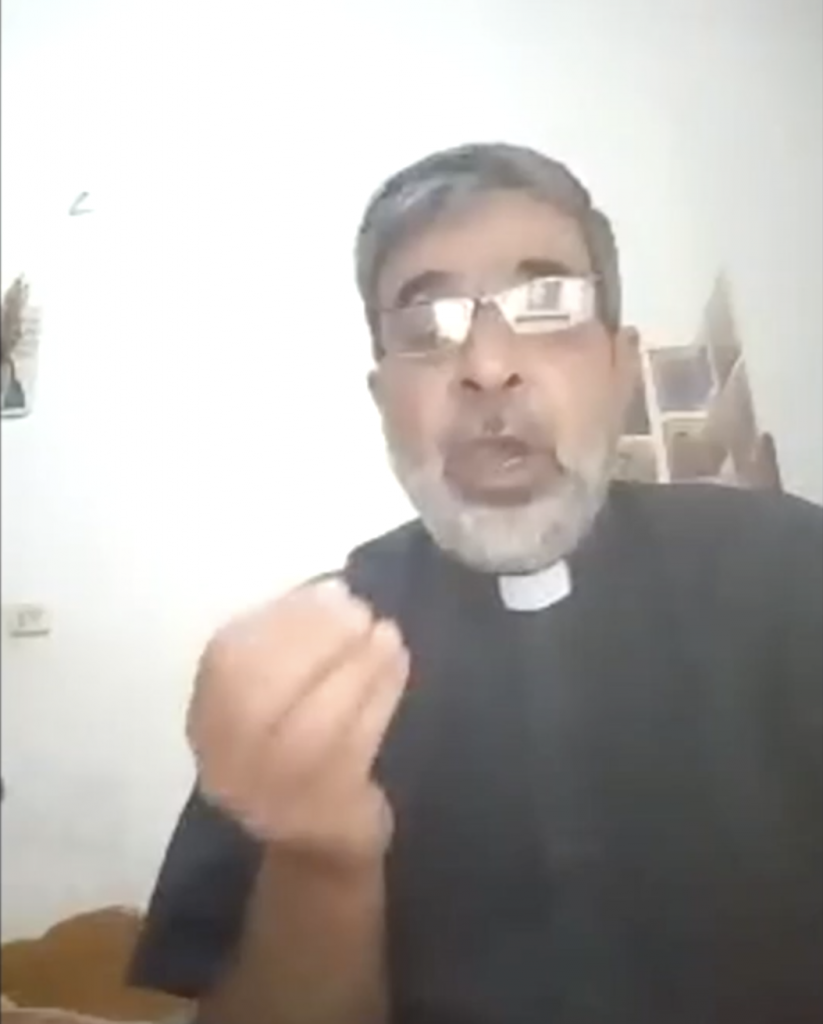
Father Firas: “So, my church was closed in 1982, the first Intifada was very bad because there was violence and the second Intifada was in 2002, also violence and in 2002 14 December 2002, I was ordained and I want to rebuild my church so I ask a favour for my friends to rebuild my church. Young people from Zababdeh who come to help me to rebuild my church these young people are Muslims and Christians. They helped me to rebuild the church to renew it, so it becomes a house of God for everyone. So, from the beginning I rebuilt the church not to be exclusive for the Christians but to be for everyone who want to worship God, and why is that? Because in God’s eyes there is no Muslim or Christian or Jewish. We are all a human being and we are all invited to worship God.”
Sheikh Ghassan: “We came to visit your church as Abrahamic Reunion, we came in a bus from Jerusalem, Muslims and Christians and so on and among us we had some Jews if you remember it was so beautiful to come there and the people wanted to pray and they wanted to go outside and pray and you said, “No. This is the House of God. Come to pray here.” And the Muslims prayed in the church and you began to pray next to them and it was so great a moment for all of us. I remember I prayed, and I cried.”
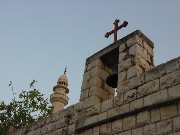
Father Firas: “The mosque is next to my church so if you come to my church you look on the top of the Church, you can see the cross with the Minaret and I took a picture with the Cross and the Minaret to be a symbol, for my Ministry.”
“How did you come to this pathway of making peace?”
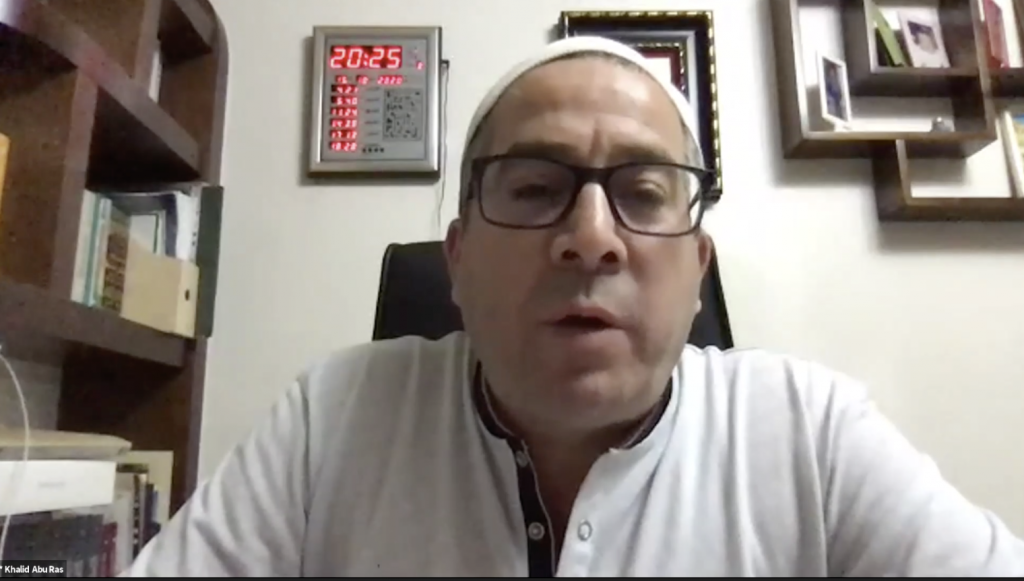
Dr. Sheikh Khalid Abu Ras: It was before the year 2000 when I met with Professor Avraham (Elkayam) and Roberto Arbib. And I was asked by Dr. Avraham how can I learn about Sufism and I told them by Abed’s father, Sheikh Ghassan Manasra. And since that time an amazing movement started, nothing is similar to it in the world, which is called The Abrahamic Path. And this movement has renewed the dialogue not only between the Muslims and the Jews but among all religions in our land.
Those meetings of all those religions who believe in one God usually call for the love of the unified one God, and that was the most important thing. And because man, I forgot to say that, it’s also religions, always call for the love of mankind and man particularly was created in a very special way by the hand of God, by the breath of God, and the spirit of God, to represent and He called and asked the angels to bow down to man according to Islam. And this movement of Path of Abraham has asked to refrain from violence, to reject violence and embrace peace, and to spread peace by ultimate peace by the meaning of all this work.”
Excerpted answers from later questions:
“How do you avoid conflict and polarization in everyday life?”
“I say to people you know that there is here a Sheikh from Al-Aqsa in Tel Aviv, they say “it’s not possible!”, and I say, “look, there is also a car with a Palestinian number,” and I take a picture of it!”
Rabbi Roberto replied that for him, interfaith connection, friendship, co-created classes and events such as the annual Rumi Commemoration in Tel Aviv that the Imam of Al-Aqsa mosque attends, these create a regular experience of connection. This also gives him stories he can relate to others — that there is a car there, at his synagogue, with a Palestinian license plate (not easy to cross the border), and that the Imam of Al-Aqsa is there in Tel Aviv — this broadens the perspective of possibility for those Rabbi Roberto meets.
Sheikh Khalid shared that, “I believe that the better and more ideal way to promote dialogue is parenting, parenting that starts from the heart from the small family from the father and mother…Parenting is the foundation of our values where it sets the ground for healthy understanding and acceptance of those who are either Buddhist Hindu Muslim or Christian or anybody who is from the creation of God. When my son sees me dealing with a person he is a human, I will become a model to my son.”
Not only does Sheikh Khalid model this behavior for his children, he sends them to a Christian-run High School in Nazareth so they don’t experience only Muslim culture.
Father Firas described the dehumanizing and dangerous conditions of the security checkpoints he has to pass through, saying, “I—I look to this crowd and between this crowd and I’m asking, looking to the heaven, looking to the sky, and I’m asking, ‘Where were you, God?'”
Father Firas explains, “I’m not examining the existence of God, I believe in Him, but I am asking “Where were you, God,” from what is going on in the Holy Land. Our ministry, Christians, Muslims, and Jewish, should be worshiping God and telling the people where is God. And to show these people who are suffering from the hatred, from the nonexistence of God in their life, these people needs to find God, and I’m sure I found the answer of my question – God is with us, God is in our ministry as a Christian, as a Muslim, as a Jew, and we can find God when we can challenge the hatred, we can challenge the evil, we can challenge the suffering in the people’s daily life.”
“That’s why I am dreaming here in Zababdeh to build a school to bring the Christians, the Muslims, and the Jewish together to teach them where is God in their life – since then, they can discover they are no more enemies but children of God.”
Sheikh Ghassan said that he feels that each must examine themselves within to uproot hatred and conflict: “It’s very important, we met with many people and had many programs in our lives to avoid these things, the challenges and the conflicts in our lives, it is to avoid it within ourselves within our hearts, we need to throw it outside to clean our insides, it’s very important to do this, because as we were in our gatherings, and meetings, and projects, we came back to our houses, and looked at the news, and saw a very bad conflict, and directly began to be very upset and so on – the most important thing is how to teach yourself to be quiet and to pass away, to go beyond all of this conflict to create a new connection.”
“How can we make peace during the Pandemic?”
Rabbi Arbib: “Yes indeed we are in very challenging situations, that all around the world we’re closed in our house, and afraid that the people we love could become malade and died, so we can as a Sufi Jew we can start about the sign that God sends to us in the Nature, and this is a tremendous sign, it’s not a sign you that can not see it. It’s very clear, the signs – the first thing that we have to say is to stop, to stop, to stop and to think. This Shabbat we will start again to read again Genesis, we finished the reading of the Torah last Shabbat, we had a festival of Simcha Torah, and now we start again in Genesis, it’s the whole book of the creation, we read it every year, but in the spiritual way we have to understand that every year, every moment is something new…
“So we have to stop, and we have to say that what it was in the past is not to be again, we have to change everyone in his own way, to change, to create more solidarity, more love, more openly, and to take a side even if there is a lot of reason to be afraid of the economical situation the medical situation, the economic crisis in the world, should bring us to change our preference of life. What we chose before as the preference of life should be changing to be more open and connecting with the world.”
Father Firas: “I’m living what you are saying exactly – I pray Sunday liturgy with few. They are five, six, seven people in the Church, and the normal Sundays we are praying 200, 300 people in the Church, but now because of the virus we are praying few people in the church, and maybe that is a message from God.
I have a joke for you. It’s a real story.
The Bishop Joseph in Haifa wanted to protest against some decision of the government, I don’t remember, so he asked the priest to close the churches, all the churches in Galilee.
And the Priest asked him, “What we are telling the people, how we are closing the Church?”
And he told them, “Well, let’s close the Church, and ask God to do the work.”
So maybe, this time, it’s time of personal prayer to God, to take an act, we all the time praying with loud voice, you know, the Muslims, the Christians, the Jewish, we love the loud speaker, so God is used to hear us praying to him in the Heaven, but maybe if we are silent this time, may God look down to find why we are stopped praying so he maybe acts.”
Sheikh Khalid: “We’ve been living in a Pandemic that the world never knew in the last century, and the spread of this dangerous epidemic that has been spreading, and maybe this makes us think, or re-think about the meaning of life. The outcome that I always come into is that we are human, and that one day we will leave this world. And what shall each and every human being do is one of two things.
First thing – how do I meet with God the Almighty after death?
Second – what has been the influence that I left in this world? Did I leave or do I leave the influence of love, peace, and things that have done great things towards the lives of people?
I’ll my sharing through a small short story that I always share to my students: the story is that Messenger Mohamad, PBUH, he speaks to us about a man who found a branch in the road. And this branch has been disturbing people, and what did this man do, he came and removed it. It’s a very short story, and what is the value of it? And God appreciated him for this, and he took him to Heaven. This is what I simply wanted to communicate to you – what is it I will do in this world until I will meet with God?”
“What is the Taste of your peacemaking and your process, for your work of many years?”
Rabbi Arbib: “It is the force that still brings me everyday and to see the way how we can create bridges with other people, not only people of my faith, but every people of humankind, but in this special time I think it’s more and more important to keep on and not to lose the faith. A lot of people you hear are completely devastated by the economic situation, but we as a spiritual leaders, we want to keep on the Tikvah – the hope – after these crises we will start a new era, a new value of understanding and goods in the world.”
Father Firas: “I can describe my ministry in Nablus and Zababdeh as building bridges. I tried to build bridges of reconciliation and peace and of meeting and connecting with others. It doesn’t matter who this “other” is – Muslim, Christian, Jew, etc. What’s important is the joy of meeting this other and seeing the image of God in him. And when I look at the other and see his face I see the beauty of God, and I say Oh God, thank you how beautiful are you for I see you in this other.”
Sheikh Khalid Abu Ras: “I’ll start by answering with a very short story – it’s about Jesus Christ, PBUH. He was with his disciples in the Holy Land and he passed by a dead dog. And his disciples were complaining so bad of the disgusting smell coming out of this dead dog. He said to them, “look, how white is its teeth.” What’s happening now during this pandemic is heavily emotionally painful for all those who lost their loved ones and family members. But as Jesus Christ said, PBUH, let us look into the positive things at this time, how the world has united to face this dangerous pandemic, and the respect of those in the medical field has increased and developed higher. And I believe we will leave victorious and with very high energies from the pandemic.”

